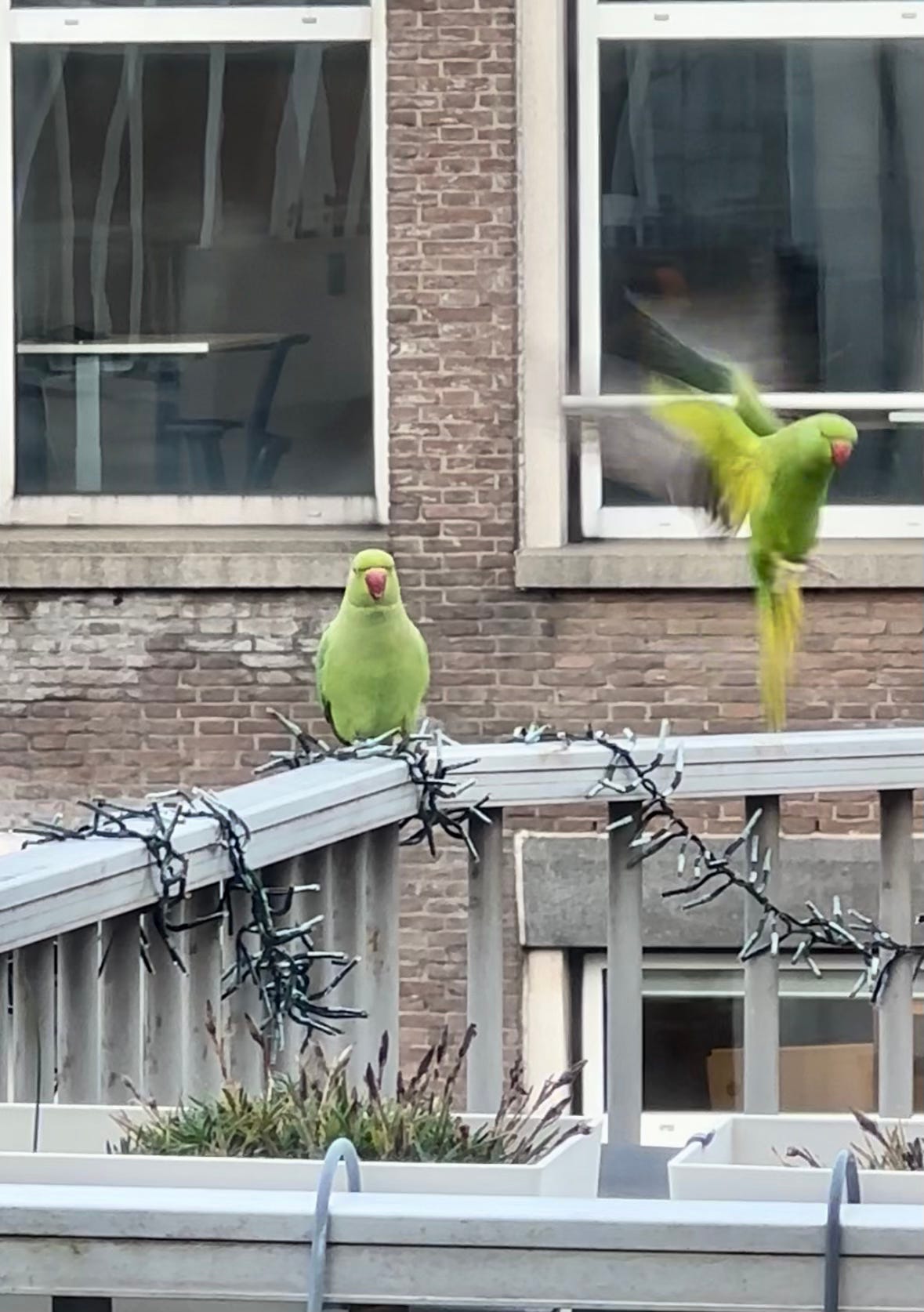Dear Pet Owner,
I recently launched free one-on-one Pet Mental Health Audits. Click below to schedule a FREE 30 minute call with me, where you can ask any questions surrounding your pet’s mental health, supplements, and lifestyle. I’m limiting this offer to just 5 people on a first come, first-served basis.
-Dr. Sami
A few days after I arrived to The Netherlands several years ago, I was walking around the city with a new friend when he asked me if I wanted to come up to his apartment to see the parrots flying in his garden.
Smooth move, I thought. This is Amsterdam. There are no “wild parrots” here.
But being the animal-lover I am, I couldn’t help but check it out.
We walked up 5 flights of stairs before finally reaching the front door of his Keizersgracht apartment. Before I could even catch my breath, he opened the doors overlooking the back garden and sure enough, there they were. A pair of bright green parrots squawking and chasing each other through the air — right in the center of Amsterdam.
You can imagine my bewilderment at my strange new land.
Where I come from, parrots live in cages, not in the “wild,” and certainly not in the city center. But since then, I see them everywhere. And not just those two — hundreds of parrots — nesting in Vondelpark, flying over Stadhouderskade, and fighting over tiny treetop territories outside my own apartment.
But how did they all get here?
Legend has it that one company had a handful of parrots caged in their office years ago. When the company went under, nobody wanted the birds, so they opened the front doors and released them outside to fend for themselves. And fend for themselves, they did!
As invasive species often do — they absolutely thrived in the absence of natural predators — bullying the smaller birds, eating up resources, and disrupting the ecosystem.
While we may enjoy to look at them, these invasive species also pose a risk to humans — carrying special diseases that can jeopardize national food security and infect us too.
One of those diseases is Psittacosis, or “Parrot Fever,” a contagious bacterial infection that is currently sweeping through Europe. According a statement released by the WHO last week, 5 people have died since the start of the outbreak 4 months ago.
Cases in the Netherlands have doubled — with each infected person having to be hospitalized (one of which has died).
Though serious illness and death from parrot fever is rare, it’s important to know how you can keep your pet birds and human family safe. A recent article in CNN Health summed up disease transmission well:
Parrot fever is caused by bacteria in the Chlamydia family that is found in a variety of wild and pet birds and poultry. Infected birds don’t always seem sick, but they shed the bacteria when they breathe or poop.
Humans commonly catch parrot fever by breathing in the dust from an infected bird’s secretions, according to the US Centers for Disease Control and Prevention. People can also get sick if a bird bites them or through beak-to-mouth contact. The disease is not spread through eating infected animals.
Human-to-human transmission is possible but rare, studies show. In most of the recent cases, people had been exposed to domesticated or wild birds that were infected, WHO said.
Most people who get parrot fever have a mild illness that begins five to 14 days after exposure to a sick bird and can include a headache, muscle pain, a dry cough, fever and chills. Antibiotics can treat the infection, and it’s rarely fatal for humans.
If you own a pet bird or work with birds, the WHO advises good hand hygiene. Owners of pet birds should also be sure to keep cages very clean and avoid any overcrowding.
If you notice any signs of illness in your pet bird, including but not limited to: discharge from the eyes or nose, diarrhea or discolored droppings (such as different shades of green), weight loss, lethargy, or any other change in their normal pattern of behavior, please contact your veterinarian immediately.
🦜
Stay safe,
Dr. Sami
PS… If a friend forwarded this to you, be sure to subscribe below. And if you found it valuable, I’d appreciate it if you forwarded it to other pet lovers. It goes a long way in helping the newsletter grow.
Do you have questions about the health of your pet bird? Would you like to schedule a virtual consultation with Sami the Vet? Click below to schedule a once-off virtual consult, or subscribe for unlimited text, call, and video consultations each month.





Jeez! Those people had no idea what they were actually doing when they released those parrots into the wild.
Great writing again Dr. Sami!
Were those parrots 🦜 over the wedding in Cartagena?
🌸🩷🌸